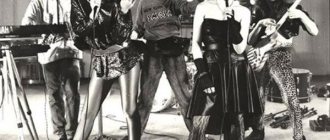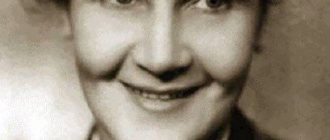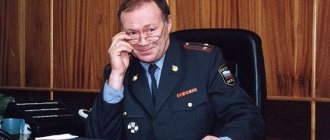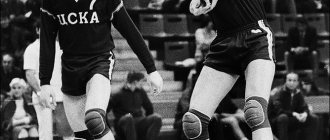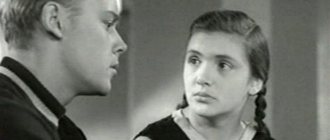The need to create a group
The success of the “Tender May” ensemble, whose group consisted mainly of high school students from boarding school No. 2, is due to several factors.
Firstly, by social necessity. The country was on the verge of redefining important human emotions. Everything that was previously taboo (love, sex, romantic relationships) began to come to the fore. The repertoire consisted mainly of songs about unhappy love, rejected expectations, misunderstandings and personal disasters.
Secondly, the ease of presentation of the material. The era of serious songs about life is ending, and instead a pop trend for discos and parties appears. An easy perception of music is in fashion, where there is no need to reflect on the meaning of life, but only to be in emotional resonance with the composition. Before “Tender May,” a similar experiment took place with the “Mirage” and “Combination” groups. But they sang for the older generation, and the young group performed exactly the teenage repertoire.
Thirdly, the influence of Western countries on the modern culture of that time. After the fall of the Iron Curtain, Soviet teenagers saw love songs as a symbol of freedom and emancipation. Fashion includes clothes, hairstyles and music from America and Europe. All these factors allowed the group to rise to such a height of fame that no one after them could conquer.
History of the group's creation
Sergei Kuznetsov worked in Orenburg at boarding school No. 2 as the head of a music club. On December 6, 1986, the ensemble gave its first performance within the educational institution. The song “White Roses,” which later became the group’s calling card, did not make much of an impression on the students. And the school management, including director Tazikenova, spoke sharply negatively about the composition.
But already in the summer of the same year, producer Andrei Razin got to the performance. He immediately takes the guys under his wing. Shatunov and Serkov are transferred to a school for gifted children, the group is officially registered, and the studio “Tender May” is opened on its basis. The composition of the group in 1989:
- The main soloist is Yu. Shatunov (vocals, saxophone).
- Second soloists and vocals, team leaders: K. Pakhomov, A. Razin.
- Vocals: Y. Gurov, V. Kulikov, A. Gurov, A. Tokarev, O. Krestovsky, Y. Barabash, V. Shurochkin.
- Musicians: R. Isangulov (keyboardist), S. Kuznetsov (author, composer, keyboardist), I. Igoshin (drummer), I. Anisimov (keyboardist), A. Burda (keyboardist), S. Serkov (lighting design).
What was the reason for such a large number of members of the “Tender May” team? The composition of the group was divided and the musicians traveled to several cities at the same time. In 1989, composer S. Kuznetsov left the group and created a new group called “Mama”. V. Boyko is invited to take his place. In 1992, lead singer Shatunov terminated his contract with the group and left for Germany, after which the collapse of the group became inevitable. In 2009, “Tender May” gives performances with a new lineup, and has some success, thanks to nostalgia and memories of the days of youth.
The photo above shows the composition of the group “Tender May” in 1988.
The formation of the lineup continued until the last day. Basically it was a recruitment of musicians for the ensemble's tour. The form of selection was varied. Participants brought their friends to auditions with personal recommendations, Razin invited musicians he knew, and also visited music schools in search of talent. As a result, the group was replenished with new keyboard players (M. Sukhomlinov, A. Yurgaitis, V. Polupanov).
Tender May
“Tender May” is a legendary Soviet group that made a real revolution in Russian pop culture.
In the early 1990s, a group of teenagers singing plaintive lyrical songs to the accompaniment of cheap synthesizers and rhythm boxes became the idol of youth, filling stadiums, selling their records in incredible quantities and causing hysteria among school-age fans. This group has performed several thousand concerts, packed stadiums and millions of sobbing girls. In 1990, “Tender May,” according to the results of a census conducted with the assistance of Central Television, had 16 million fans. Every third teenage girl fell asleep with the name of Yura Shatunov on her lips. It was with the advent of this group that people started talking about show business in the country for the first time. It was not exemplary pioneers with ideological songs who took the stage, but normal teenagers with songs about what, according to the “patriots,” we never had. Before “Tender May,” there were no youth concerts, there were only children’s matinees, preschool evenings, where poor children were forced to stand “at attention.” This group blew up the entire outdated system; at their concerts they cried, screamed, and school activists who were excellent students even waved their underwear. Students exchange Pioneer and Komsomol badges for badges with the image of Shatunov and other “May” symbols. In other words, the youth, tired of parades and songs, finally had leaders whom they were ready to follow to the ends of the earth. It all started in 1986 in the distant city of Orenburg. An unknown young and talented poet and composer Sergei Kuznetsov, who returned from the army, began working as the head of a music club at boarding school No. 2. He decides to create a children's musical group, the soloist of which is a pupil of the Akbulak orphanage, 13-year-old Yura Shatunov, born in Bashkiria and remained an orphan at the age of four. Kuznetsov seeks his transfer to Orenburg and a month later their first concert took place at the school New Year's party, where they found their first success. Then everyday work began: rehearsals and song recordings were complicated by the lack of experience, more or less decent equipment, as well as the reluctance of the boarding school administration to take responsibility for such a group. Pressure from the director of the orphanage, Shatunov’s constant and prolonged escapes from school, twice led to the collapse of the team. In the spring of 1987, Kuznetsov decides to take on a second soloist, 15-year-old Konstantin Pakhomov. The group “Tender May” is formed. Later Alexander Priko, Igor Igoshin and Sergey Serkov joined the group. The first line-up of the group was finally formed in the spring of 1988. In February 1988, their first magnetic album appeared in sound recordings, recorded on Elfa and Comet household tape recorders. From the very first days, the recording was an incredible success, Orenburg and the region were raised to their feet. Letters were sent to the editorial offices of local newspapers and on TV asking them to tell about the unknown but already beloved group. The first article about them, “Unknown Stars,” appears in the Orenburg newspaper “Komsomolskoye Flame,” and after it, local TV comes to the boarding school and films a report about Yura Shatunov. The girls fall madly in love with a romantic boy and the first fans rush to the walls of the orphanage, whose administration begins to go into shock. The persecution begins against the newly minted “stars”.
By the summer of the same year, the magnetic album fell into the hands of Andrei Razin (real name and surname Vadim Krivorotov), then working at the Moscow Record studio. Without thinking twice, Razin decided to make a sensation out of this group. Having gone to Orenburg and introducing himself as an employee of the Ministry of Culture, he seeks to transfer Shatunov to Moscow to boarding school No. 24.
It should be noted that Andrei Aleksandrovich was guided by similar unconventional methods throughout all the years of the existence of his team. Within a very short time, the rest of the group moved after Shatunov. In the capital, Andrei Razin becomes the head of the musical group, and Arkady Kudryashov, who previously worked in the Mirage group, becomes the producer. “Tender May” begins to gain momentum; in January 1989, the video for Sergei Kuznetsov’s superhit “White Roses” was shown for the first time on Central Television. After this the real boom begins. Songs are heard from everywhere - in discos, from the windows of houses and cars, people of all ages listen to them. From the very beginning, “Tender May” brings together the capital’s largest stadiums – Luzhniki and the Olimpiysky Sports Complex. However, not everything was so smooth and simple within the team; the creative union of Razin-Kuznetsov did not last long. At the beginning of 1989, the composer left the group, taking with him two musicians - Igor Igoshin and Sasha Priko, who later became the soloist of Sergei Kuznetsov's new musical project - the group "Mama". The split is accompanied by scandal. After Kuznetsov left, Razin began expanding the team and created an entire studio from the group, where there is a continuous flow of changes of musicians and soloists, and magnetic albums are released monthly. By the summer of 1989, the last members from the first lineup, Konstantin Pakhomov and Sergei Serkov, left the group. Shatunov remains under the leadership of Arkady Kudryashov, who by that time became its director. Only thanks to these people, “Tender May” did not lose its face.
The split had an extremely negative impact on the creative potential of Tender May. Vladimir Shurochkin, who came to the group, although he composed good songs, still could not compare with Kuznetsov. At the same time, Shatunov is having problems with his voice, a replacement cannot be found to replace Pakhomov, and, in addition, many scandals are occurring around “Tender May,” fueled by journalists. Because of all this, the second half of 1989 became a period of offensive creative downtime for the group. By the end of the year, Shurochkin moved away from the group, founding a solo project and focusing primarily on it. Andrei Razin tries Yuri Kulikov as the new composer of the group, and after the failure of the “October Album” he wrote, he replaces him with Anatoly Meshaev. At the beginning of 1990, the album “Silly Snowflakes”, delayed by more than six months, was released. Instead of Pakhomov, Oleg Krestovsky comes to “Tender May”, and, in addition, Razin takes two new soloists into the group - brothers Yuri and Andrei Gurov.
It is impossible to convey all the gossip and rumors that were circulating around the group at that time, this is what director Kudryashov thought about it: “Write good or bad about us, for us any advertising is good.” The nickname “Ostap Bender-2” is firmly attached to Razin, his life principle: “You can’t get into big life without bluff and scandal.” But his motto did not always work to his advantage; in the fall of 1989, a criminal case was opened against Andrei Alexandrovich, which, however, was dropped after a few months. During the school winter holidays, for two years in a row in Moscow, the Olimpiysky Sports Complex hosted the largest concerts of the group “Tender May”, the show-revue “White Roses in White Winter”, which, in terms of popularity and the number of tickets sold, was behind A.B. Pugacheva. Already before the first performances, the first music newspaper in the history of the Soviet stage, published by the group itself, was sold in the foyer before the concert. “Tender May” now has its own printed organ with the same name. You could subscribe to the newspaper at any post office in the Soviet Union. A little later, Razin published his first documentary book, revealing the history of his life and the team, which by that time had become family. Both scandalous and positive articles and the most controversial opinions constantly appear in the press. The group is called “the standard of vulgarity” and “a symbol of purity and nobility.” And at this time, “Tender May” gives an incredible number of charity concerts. With the full financial support of the studio, the reconstruction of Moscow boarding school No. 24 is underway. At their performances there are always free tickets for children from orphanages.
In 1990, the video film “How Much Are Affectionate Nowadays” was shown on television, the characters of which certainly became everyone’s favorites. From the film, fans will learn a lot of new and unknown things about the behind-the-scenes life of their idols. Fan clubs are being created across the country. By this time, the studio “Tender May” had grown so much that fans did not have time to remember the names of the new, endlessly changing soloists. A huge number of doubles are traveling around the country. However, in fact, the true face of the “Tender May” group remains Yuri Shatunov and Andrei Razin. Things are reaching the point of absurdity. At the same time, in five cities of the country there were posters advertising concerts with the participation of Yura Shatunov, people went to see their favorite artist, but anyone but Yuri Vasilyevich appeared on stage. His absence was explained by illness, adolescence, and loss of voice. Shatunov was indignant, but he could not resist Razin’s orders. Razin himself, meanwhile, moved somewhat away from his musical career and became interested in politics and business. This results in increased chaos in the group, to say the least. There is a leapfrog with the lineup, the release of new albums is delayed, and the organization of concerts is deteriorating. Razin’s new idea - the production studio “Laskovy May”, which promotes young performers - also has a negative impact on the group. New “stars” of Razin’s studio are increasingly taking part in concerts, and Razin is paying less and less attention to the “Tender May” group itself.
Since the beginning of 1990, Yura practically left the capital and moved to a mansion bought a year ago in Sochi, where he seriously took up his studies. A teacher lives in the house with Shatunov, with whom he flies to Moscow once a month to take exams and tests. Thanks to such hard work, Yura graduates from school with "4" and "5", and with his logic he sometimes baffles even Andrei Razin. My favorite subjects at school were literature, as well as Russian and English. Yura learned the last one perfectly. He also studies computers with great interest and tries to write music himself. By the end of 1991, Yura Shatunov became so independent that he could easily create his own solo project. Dejected by the situation in the group, in the spring of 1991, Sergei Serkov, who decided to join the “Mama” group, and Andrei Gurov left “Tender May”. The group is frankly falling apart, and everyone understands this. Only Shatunov and Razin remained from the original lineup, and the other members of the group were noticeably inferior to them in talent. The successful album “You Know...”, released in the summer of 1991, could not change anything. The framework of “Tender May” became too tight for Shatunov, and in January 1992 he was the last to leave the team. Arkady Kudryashov fully supported his ward. Following this event, the entire “Tender May” disintegrates. An endless series of scandals and disagreements begins, old grievances and debts are remembered. Shatunov, instead of creative growth, is forced to devote his energies to defending his personal interests. Eight months later, the singer could not take away Razin’s passport. The media are involved in the scandal. The whole country has the opportunity to observe how former colleagues share creative and material values. Razin's attempt to replace him with a new soloist failed, and Tender May ceased to exist.
After leaving the group, a difficult period began in Shatunov’s life, aggravated by scandals and disagreements with the former “leadership”. The fate of some other members of the ensemble turned out to be even more tragic. Recalling his past, Yuri says that life as part of “Tender May” was pure hell for him and almost led him to suicide. Now he wants to prove to everyone that he has become different and is going to strive only forward. In 2002, the matured Shatunov presented to the public a new program “Grey Night”; The album of the same name becomes one of the undisputed hits of the summer season.
Currently, Andrei Razin has chosen a political path and moved to the Stavropol Territory. He became one of many politicians who are popular among Stavropol residents. Sergei Kuznetsov still continues to write super hits. In 1994 he created the group “Ink for 5th grade”. Konstantin Pakhomov starred in the film “Mannequin in Love” and graduated from the Institute of Culture. Currently holds a senior position in the Moscow ice cream company Ais-Fili. Vladimir Shurochkin has been working on a solo project since 1996. Re-released two albums “Mashka-Matryoshka” and “Goodbye, Baby!” at the Soyuz studio. under your own name. In 2002, he recruited new soloists for the “Tender May NEXT” project and released an album of the same name with cover versions of the most famous hits of the “Tender May” group. The Gurov brothers ended their musical career after leaving the studio. Oleg Krestovsky, having left the group, went to his hometown of Kyiv, got married, divorced... Sergey Serkov lives in Moscow and works part-time as a drummer at concerts of the group “Ink for the 5th Grade”. Alexander Priko was the lead singer of the group “Mama”, then was engaged in the sale of household appliances at VDNKh. Lives with Yana Sklobinskaya. Igor Igoshin tragically died as a result of a fight in the Moscow Tekstilshchiki district.
LASKOVY MAY (Group “Tender May” named after Public Transport, Wide Open Windows and Tearful Fans of the Most Frivolous DISCO Music in the World) - (1986-1989), Soviet pop group, leader Sergei Kuznetsov.
Biography of Yuri Shatunov
Vera Shatunova married Vasily Klimenko when she was 18 years old. The husband (5 years older than his wife) reacted so coolly to the birth of his son that he did not give him his last name. Vera registered Yura as her maiden name and sent the child to her parents. Grandfather Gavrila Egorovich and grandmother Ekaterina Ivanovna raised their grandson in the village of Pyatki until he was 4 years old.
After 3 years, Vera divorces her husband, takes her son to the village of Savelyevka and marries a second time. Yuri's stepfather suffers from alcohol addiction and does not like someone else's child. During each of his drinking bouts, young Shatunov runs to Pyatki to see his grandmother. In 1984, the mother became seriously ill and sent her son to Kumertau to a boarding school, and on November 7 she died of heart failure. The natural father refuses to take the child, who is already 11 years old, and the guardianship authorities will not let him go to his stepfather, as if he were an insolvent citizen. Grandfather and grandmother find themselves in a position where their age, by law, does not allow them to be guardians; the boy is taken by Nina Gavrilovna, an aunt from the village of Tulgan.
But the stress of losing a mother turns out to be stronger than others expected. Yura runs away again and wanders around Bashkiria for several weeks. Finally, he is taken into the care of the Orenburg boarding school. There he met Kuznetsov and at the age of 13 performed his first hit, “White Roses.”
Singer Shatunov
The main part of the ensemble had already been formed at school, only the performer was missing. The first composition of the group “Tender May” included: S. Kuznetsov (played keyboards), V. Ponamorev (bass guitar), S. Serkov (light music). With the arrival of Yura Shatunov, the group began performing in cultural centers and discos. Until 1988, they performed songs by the director of the ensemble: “Winter Evening”, “Blizzard”, “Summer”, “Gray Night” and other compositions.
To continue his musical education, Shatunov goes to Germany, where he studies to become a sound engineer. Kudryashov, with whom they have been friends for many years, becomes its producer. Yura continues his fruitful collaboration with the old author Kuznetsov, and since 1992 he has released several solo albums.
In 2000, he meets a girl named Svetlana, the romance lasts 7 years and in 2007 they get married in Germany. By this time, they already have a common son, Dennis. In 2013, a girl, Estella, was born into the family. In 2020, Yuri Shatunov was awarded the state award “For Contribution to Russian Culture.” He maintains friendly relations with the new members of the “Tender May” group. Especially with Serkov, with whom he studied at a boarding school, and Andrei Razin even became godfather for his son.
Yuri Shatunov (44 years old)
Yuri Shatunov
Many still call Yuri Shatunov the main voice of the group, despite the fact that he has not been a member of Tender May for a long time. A boy with an incredibly pretty appearance, singing “White roses, white roses”, won millions of hearts, which sang along with him the words of the famous song. In 1991, the group broke up. And Yuri went to Germany, where he received an education as a sound engineer. Now the singer is married and has a son and daughter. In recent years, Yuri sometimes performs at “Legends of the 80s” concerts, and also releases solo compositions: the latest are “And I’m with the Guitar” (2017), “Don’t Be Silent” (2018) and others.
Producer and performer Andrey Razin
Andrey was born in 1963. When he was barely a year old, his parents died in an accident. The child ended up in an orphanage in the city of Svetlograd.
Razin is a mason by profession, at one time he worked laying a gas pipeline, and in 1982 he entered the school of cultural education. Served in tank forces for 2 years. For the first time he went on stage to sing a duet with Ekaterina Semenova from the Mirage group, where he worked as an administrator.
The composition of the group “Tender May” of the 80s and 90s was formed by himself. This was his first experience of a multi-crew group, when several teams simultaneously gave performances in different cities. The trick with the doubles turns into a huge scandal, from which Razin gracefully emerges by declaring himself a relative of Gorbachev.
Andrei Razin is the editor of the newspaper “Tender May” and the author of two books about the creation of the group and the fate of the participants. He released three solo albums in 1990, 1996 and 2000. Married, has two children from different wives.
The most famous "Tender May"
Nobody knew that the ensemble had broken up, and one disc jockey on the train listened to the recordings of the ensemble, which were heard by his neighbor in the compartment - Andrei Razin (b. 15 or 18 September 1963) (according to one version - Vadim Aleksandrovich Krivorotov, changed his name and last name in Pskov), also an orphanage resident, in 1988 he worked in the Record studio, which found and promoted talented performers (there is a version that Razin sang for the first time in a duet with Ekaterina Semyonova). Razin, having asked everything from the disc jockey, immediately went to Orenburg to “put things in order.” Having learned that Kuznetsov was under investigation, he printed himself a Certificate of Plenipotentiary Representative of the USSR Ministry of Culture and pulled Kuznetsov free. Having involved the police, I found Shatunov in the steppe. He transported them to Moscow. First, Razin appeared on television with Kuznetsov’s song “Masquerade”. On September 20, 1988, the first concert of the new “L.M.” took place in Almaty, from which tours and mass popularity began. Subsequently A.R. transferred all the other students of S.K. to Moscow. Pakhomov became a soloist, Serkov became a drummer, Priko and Igoshin became keyboard players. (Kuznetsov still played the electric organ, and Priko and Igoshin played “combs”, one of which was bought from the group “Zemlyane”, and they bought it from the famous French group “Space”). The group consisted of 7 people.
At the same time, disagreements began to arise within the ensemble. Razin took the bulk of the money for himself, exploiting the musicians. Realizing this, in March 1989, Kuznetsov was still able to leave Razin, going back to Orenburg, taking Priko and Igoshin with him (2 months later, all three, having involved Vyacheslav Ponomarev, created a new ensemble “Mama”). Subsequently, Pakhomov left the group at the end of 1989 (solo career), in 1991 - Serkov (to the group "Mama"), at the beginning of 1992 - Shatunov. Thus, in March 1989, “LM” with Kuznetsov completely collapsed.
Happy fate of the participants
After the group broke up, everyone went their own way. No one could repeat the fantastic success experienced at a young age. What was the fate of those who were part of the “Tender May” group? Vladimir Shurochkin, who performed the ensemble’s hits in one of the brigades, became the father of Anna Shurochkina. A girl under the pseudonym “Nyusha” performs songs of her own composition, writes music, and plays in films.
Konstantin Pakhomov has his own business. Kuznetsov first wrote songs for artist friends, and in 2013 he opened a website. Yuri Barabash, under the pseudonym “Petlyura,” performed chanson until his death.
The fate of other participants
Yuri Gurov at the age of 41 died in a car accident. In 1992, after a fight, Igor Igoshin jumped out of the window of a multi-story building and died in intensive care. In 2013, Igor Anisimov was killed with a knife as a result of a quarrel with drunken friends. In 2012, the body of Alexei Burda was discovered near the cemetery; the cause of death was alcohol poisoning.
Mikhail Sukhomlinov was shot dead in 1993 in front of Yura Shatunov at the entrance to his own house. Arvid Yurgaitis had a hard time breaking up with the band members, became addicted to drinking, and in 2004 burned down at his dacha.
People's love
In the history of Russian show business, no one is able to repeat the short but fantastic success of the “Tender May” ensemble. The composition of the group (there was a photo of the participants in every house) changed, despite this, the artists were always carried in their arms. For the first time, the country was faced with the frenzy of fanatical attitudes towards musicians among young schoolgirls. An ambulance was on duty at every concert because female spectators lost consciousness. The most diligent students threw their underwear onto the stage. It was after Shatunov’s performances that methods were developed for taking artists out secretly from the public.
The real “Tender May”
The ensemble “Tender May” appeared in 1986 in Orenburg, it was created by the poet and composer Sergei Borisovich Kuznetsov (b. January 7, 1964), who decided to create a group of schoolchildren. With the help of his friend Vyacheslav Ponomarev (b. ca. 1969), he finds “a boy with amazing hearing” Yura Shatunov (b. September 6, 1973) - an orphan who was raised in a nearby orphanage. (S.K. worked in a boarding school).
The first performance took place in an Orenburg boarding school on December 28, 1986, where the name of the group spontaneously arose from a line in the song “Summer” (“...But gentle May will come into its own...”). Composition: Kuznetsov - electric organ, Ponomarev - bass guitar, vocals - Shatunov. Songs that Kuznetsov had written in the army before were performed. Soulful lyrical songs and dance arrangements ensured the ensemble success throughout Orenburg.
But the ensemble worked on the scale of a boarding school, and its director considered them musical dissidents, trying to break up the group; it broke up twice. But the ensemble’s recordings spread, and soon TV began to come to the “city star” Yuri Shatunov at the boarding school, and gradually the recordings were distributed throughout the USSR. “...The whole scoop listened to us..” (S.K.) . Due to the lack of high-quality equipment, the ensemble performed to instrumental phonograms (“minus one”), which increased the hatred of the boarding school director. At this time, the second soloist Konstantin Pakhomov (b. January 13, 1972) appeared, Kuznetsov began studying with Sergei Serkov (b. January 3, 1974), Alexander Priko (b. September 7, 1973), Igor Igoshin (June 6, 1972 - 29 Feb 1992). In the spring of 1988, equipment unexpectedly disappeared from the orphanage and Kuznetsov fell under investigation (version - the statement was filed by Yu. Sh. himself), Shatunov escapes. On May 31, 1988, the ensemble disbanded.
